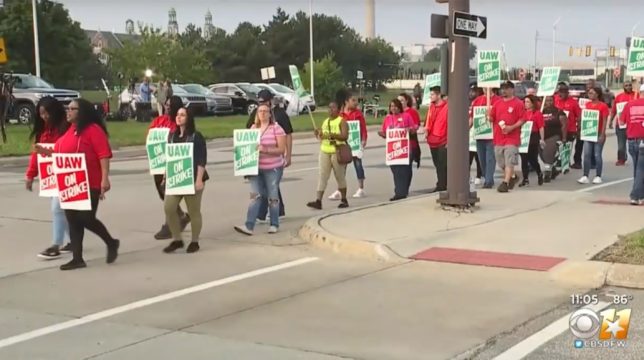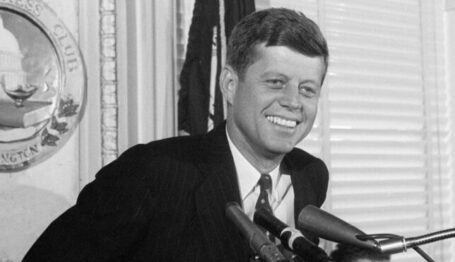Labor Watch
Democrats Propose Giving Labor the Left’s Favorite Tactic
 United Auto Workers on strike against General Motors in September 2019. Source: CBS DFW and YouTube.
United Auto Workers on strike against General Motors in September 2019. Source: CBS DFW and YouTube.

The Protecting the Right to Organize Act (PRO Act, H.R. 2474) is a laundry list of terrible policies and favors to Big Labor from its Democratic supporters in the House of Representatives. CRC and many others have written on the PRO Act’s parade of horribles, from making employees’ personal contact information available to union organizers, to targeting franchised small businesses with “joint employer” liability, to overriding all state right-to-work laws, thus requiring all private-sector workers in unionized shops to pay union fees, whether they support the union or not.
But PRO Act’s worst feature would be repealing the provision of the National Labor Relations Act enacted in 1947 that prohibits “secondary boycotts” by labor unions.
Secondary Boycotts
You may now be asking, “So what the heck does that mean?”
A “primary boycott,” whether in labor relations or general public advocacy, is aimed at a business or government agency that the boycotter believes is doing something wrong. In labor relations, this often takes the form of a “primary strike,” in which a union strikes against the its members’ employer for a better contract. The recent strike at General Motors, in which GM workers represented by the United Auto Workers walked off the job as part of contract negotiations, is a textbook primary strike—action taken directly against the employer under dispute.
But suppose the UAW started picketing the Wynn Las Vegas or threatened to strike the casino unless it cancelled a contract to buy GM vehicles if the strikers at GM did not get what they wanted. The target—the employer said to be doing wrong—isn’t Wynn; it’s GM. So the strike would be secondary, targeting a third party (Wynn) not party to the labor dispute (between the UAW and GM). The purpose of a secondary strike or boycott is to coerce the targeted third party to act on the activist’s behalf, whether or not the third party supports the activist.
A 1947 law forbids secondary strikes by labor unions. (Precisely what conduct is banned is a highly technical area of law; the National Labor Relations Board has a very complicated overview of the situation at its website.) But outside of labor relations, left-wing groups (both organized and disorganized) use secondary boycotts to achieve all sorts of goals. Media Matters and similar progressive press critics pressure businesses to pull their advertising from right-leaning opinion shows . The city council of San Francisco passed a resolution proclaiming that the city should “take every reasonable step to limit those entities who do business with the City and County of San Francisco from doing business with” the National Rifle Association—targeting city contractors to get at the gun rights group. Then its members remembered—or were advised—that the First Amendment also applies to them.
A Crucial Tactic of the Left
Why is this tactic so crucial to the organized Left? Former union organizer Josh Eidelson explained at the socialist website Working In These Times: “Secondary targets make for soft targets.” (Eidelson has since became an “objective” labor reporter for the “mainstream” metropolitan-liberal Bloomberg media.)
Eidelson objected to regulations prohibiting labor unions from using secondary strikes, ignoring that the government already grants a number of privileges to labor unions that other advocacy groups do not enjoy. These privileges include, most notably, the power to bargain on behalf of unwilling workers. If the PRO Act were to pass, unions could make those unwilling workers throughout the United States pay for the privilege of union representation.
PRO Act’s Consequences
The PRO Act’s expansion of secondary boycotts would have clear consequences for employers: more union hostilities coercing small businesses to align with the union agenda. Consumers could expect more disruptions to customary commerce, as unions strike for economic ends and “social justice unionism”—liberal social policy. And workers will pay for it all, whether they want to or not.



